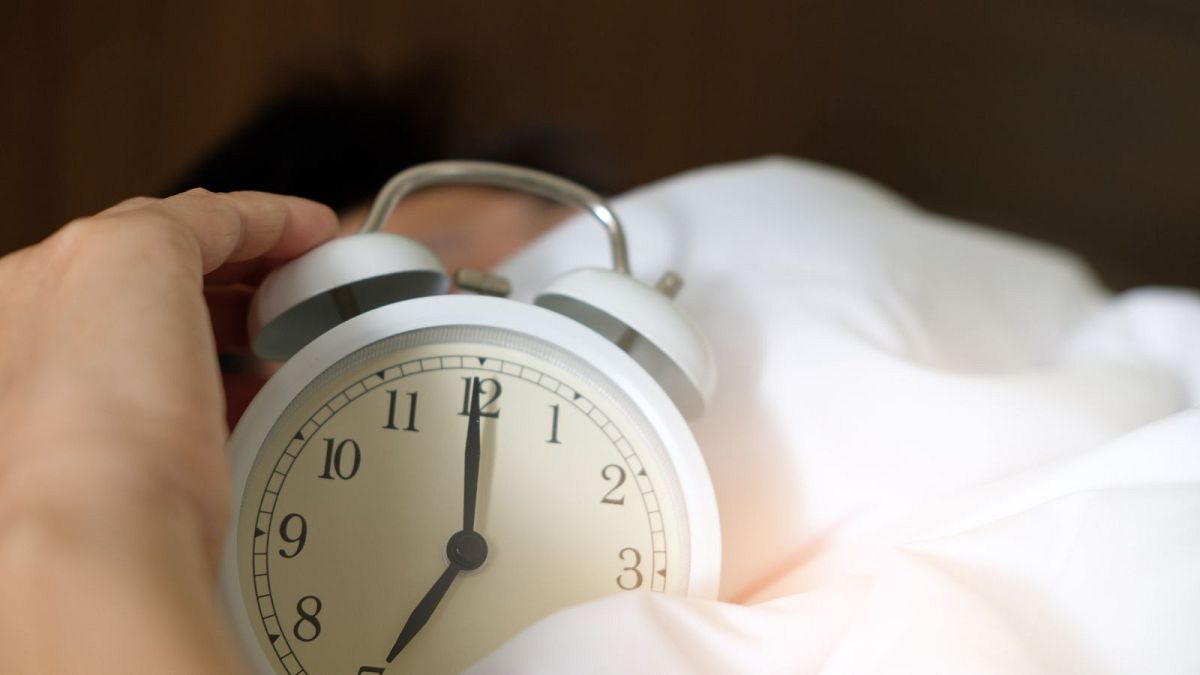How daylight saving impacts your health as Europe changes clocks

Most of Europe will end daylight saving time this weekend, turning clocks back by one hour. But what are the potential health impacts of this practice?
Clocks in multiple countries in Europe will move back one hour early on Sunday, marking the end of daylight saving time.
This seasonal time shift happens twice a year, switching to daylight saving time (DST) in the spring, when clocks move forward one hour, and returning to standard time in the fall.
Although the clock change has been a standardised practice for years and is common in most of Europe and the United States, and parts of Canada, Australia, and Latin America, health experts warn it may be harmful to people’s well-being.
Earlier this week, a team of sleep researchers from the British Sleep Society published a position statement urging the UK government to abolish the twice-yearly clock changes.
The statement, published in the Journal of Sleep Research, advocates for adopting standard time year-round as it aligns more closely with “the natural light-dark cycles of the day and night”.
“Restoring permanent Standard Time would mean our clocks would be closely aligned to solar time, and while it would mean earlier sunsets in the summer, there would be additional benefits to health from improved sleep and circadian alignment due to increased exposure to morning sunlight from autumn to spring,” Malcolm von Schantz, professor of chronobiology at Northumbria University and a member of the Northumbria Centre for Sleep Research, said in a statement.
The researchers added that maintaining a good sleep routine and exposure to natural daylight in the morning are important components of human health and disruptions to either of these factors could lead to negative health effects.
“If you aren’t getting that morning light exposure then you’re not regulating your body clock as well as you could be, and there’s really sort of a specific time in the morning that you need that light exposure in order to help regulate your body clock, and that allows you to fall asleep early enough at night,” Dr Megan Crawford, senior lecturer in psychology at the University of Strathclyde and lead author of the statement, told Euronews Health.
“If you’re not doing that, you’re kind of burning the candle at both ends, and then you’re losing that sleep at night, you’re getting poor quality of sleep, and poor quality sleep is linked to a lot of health outcomes, mental health as well as physical health,” she added.
What are the health impacts of daylight saving time?
One main reason the experts provide in favour of discontinuing seasonal time change is its impact on the human circadian rhythm.
The circadian rhythm is the body’s biological clock, which operates on a 24-hour cycle, and according to the researchers, plays a role in regulating essential bodily functions, including sleep, hormone release, metabolism, and mood.
The disturbances that come from gaining or losing an hour of sleep interfere with the natural sleep cycle and affect these functions.
Crawford explained that while the time change “doesn’t really make a difference” in summer, when sunrises are still very early, the same isn’t true in other seasons.
“In spring and autumn, the sunrise is a little bit later, so by getting up an hour earlier we may be getting up in the dark. And that’s really problematic because we need morning sunlight in order to regulate our body clocks and for optimal sleep,” she said.
Well-timed light exposure keeps the circadian cycle aligned to the 24-hour day as the morning light promotes natural waking and enables early sleep onset in the evening, the statement said.
However, exposure to light at night, which could happen during time shifts, makes it harder to fall asleep and wake up on time.
Multiple scientific studies have also found evidence of increased adverse health consequences following the time shift.
For instance, a meta-analysis based on seven studies involving more than 100,000 participants found that there was a significantly higher risk of heart attacks, in the weeks following spring and autumn DST transitions.
Another study by researchers in Finland found that hospitalisations for stroke increased in the first two days following the time change.
Research has also linked it to rises in mental health issues and mood disturbances, especially in vulnerable individuals, including an increase in suicide rates in the weeks following the start of daylight saving time.
Crawford attributed the resistance to ending time changes to a “lack of understanding,” emphasising that the benefits of extended evening daylight in the summer would remain, regardless of whether DST is used.
“A lot of people think that Daylight Saving Time gives them more sunlight or more daylight, but that won’t change. The sun won’t change just because we’re changing our schedules”.
Europe’s stance on daylight saving
In 2018, the European Commission proposed ending the twice-yearly clock shifts in the European Union.
As part of the proposal, it also conducted an online consultation to determine the views of EU residents on the topic.
Support for ending the clock changes was significant, with rates ranging from as high as 95 per cent in Poland and Finland to 44 per cent in Greece.
The responses showed that an overwhelming majority of respondents favoured putting an end to the practice, with an average of 84 per cent of people across the EU supporting the change.
However, while the European Parliament voted in favour of adopting the change, the European Council has not agreed to it, and DST transitions have continued.
World News || Latest News || U.S. News
Source link



